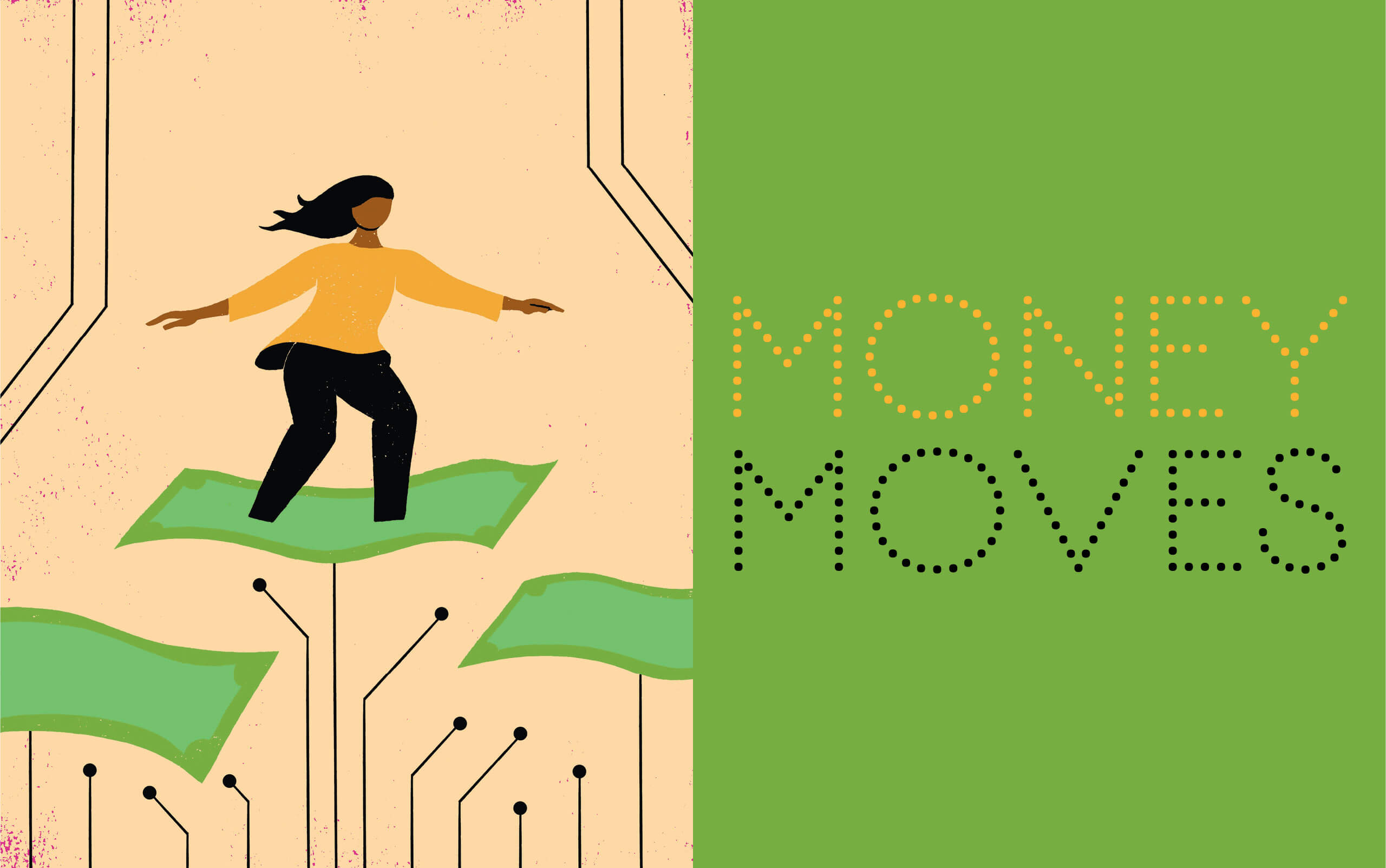Haas alumni ride the wave of fintech revolution

After growing up in India and emigrating to the U.S., Harsh Sinha, MBA 14 (shown left), learned firsthand about the oft-hidden fees involved in moving money globally. Traditionally, dollars sent overseas go through a network of correspondent banks in two or more countries, each marking up the exchange rate along the way. Remitting wages back home, booking a hotel room, paying a foreign supplier—all are subject to markups.
“I remember how expensive it was just to get Indian rupees converted to U.S. dollars for my tuition,” he says. “Banks were saying they had no fees, but the fees were hidden in the exchange rates—sometimes as high as 5% to 8% markups. It felt like a racket.”
Twelve years later, Sinha is helping eliminate the costly intermediary fees as chief technology officer at Wise, a London-based company started in 2010. Wise (previously Transferwise) has bank accounts in 80-plus countries. A person in the U.S. sending money to France, for example, would deposit dollars in Wise’s U.S. bank, and Wise’s French bank would deposit euros into the recipient’s account.
“The money never crosses borders,” says Sinha, who has helped grow the company from 40 to 550 engineers over the past five years, making it one of the world’s leading fintech firms. It went public in July, listing on the London Stock Exchange.
Instead of marking up the exchange rate, says Sinha, Wise charges a transparent fee that is five to eight times less than what banks charge, and the money generally reaches the recipient in one day or less—versus two to five days for bank transfers.
Wise is part of an explosion of companies using technology to offer financial products or services that are quicker, cheaper, or more accessible than what mainstream banks, brokerages, and insurance companies offer. And according to those in the know, we’ve thus far seen only the beginning of the fintech revolution.
Sinha is one of many Haas alumni at the forefront. Haas grads are playing leadership roles in determining how money moves at companies large and small—including some hatched at Berkeley—as well as at venture capital firms and big banks.
“Fintech applications are increasingly disrupting many aspects of everyday life: from how we pay for our coffee to how we trade stocks and apply for a mortgage,” says Professor Paul Gertler, the Li Ka Shing Professor of Economics and faculty director of the Institute for Business and Social Impact (IBSI). “If properly harnessed, fintech has the potential to do something even more revolutionary: provide access to millions of historically underserved people or those lacking access to the traditional financial system.”
The Dawn of Fintech
While the fintech era may have started when PayPal (then named Confinity) launched money transfers via email back in 1999, two things lit the flame: the 2007 introduction of the iPhone, which allowed for mobile financial transactions, and the 2008 financial crisis, which left many consumers distrustful of large banks and Wall Street firms. Over the past year, the COVID pandemic gave fintech firms another boost by forcing more commerce online. Suddenly, businesses of all kinds were clamoring for digital payment options.
Today, many fintechs have valuations that rival—or exceed—the nation’s largest financial institutions. Earlier this year, JPMorgan Chase CEO Jamie Dimon labeled fintechs an “enormous competitive threat” in a shareholder letter, contending that fintechs had an unfair advantage because they weren’t subject to the same regulations as banks. Others say regulators have given fintechs a wide berth in part because they’re reaching populations unserved or underserved by mainstream institutions.
Bill Rindfuss, executive director of strategic programs in the Haas Finance Group, says that in some ways, regulations are protecting banks. “Technology has kind of eaten some industries: Retail really stands out, and it’s rapidly encroaching on transportation,” he says. “But it seems like there’s more of a symbiotic relationship between technology and finance.” Only regulated banks can offer products insured by the Federal Deposit Insurance Corp., and as some banks have acquired fintechs, some fintechs have started, acquired, or partnered with regulated banks so they could offer insured deposit accounts or other services.
Making Payments Simple
One example of this interdependent relationship is online payments—highly regulated because of the often-sensitive credentials, like credit card numbers, required to conduct a purchase.
 “Payments is an unbelievably massive market,” says Brian Dudley, BS 11 (shown right), a venture capitalist specializing in fintech at Adams Street Partners. Indeed, Boston Consulting Group predicts that global payments revenues could grow to $1.8 trillion by 2024—a 20% increase from 2019. It’s also incredibly complex to set up payments in multiple countries with different regulations and payment preferences, Dudley notes.
“Payments is an unbelievably massive market,” says Brian Dudley, BS 11 (shown right), a venture capitalist specializing in fintech at Adams Street Partners. Indeed, Boston Consulting Group predicts that global payments revenues could grow to $1.8 trillion by 2024—a 20% increase from 2019. It’s also incredibly complex to set up payments in multiple countries with different regulations and payment preferences, Dudley notes.
Stripe is one company facilitating those transactions for online businesses. Its core software product ensures that information is handled in a compliant manner while allowing companies to accept many payment types—such as debit, credit, ACH, and wire transfers—in many countries, with one integration.
 Andrew Lee, MBA 15 (shown left), manages partnerships for Stripe, whose customers range from early stage startups to large public companies such as DoorDash and Lyft. It may surprise some people, but “we’re still in the early innings of the move to digital,” Lee says. “During COVID, brick-and-mortar retailers realized that they were underinvested in e-commerce.”
Andrew Lee, MBA 15 (shown left), manages partnerships for Stripe, whose customers range from early stage startups to large public companies such as DoorDash and Lyft. It may surprise some people, but “we’re still in the early innings of the move to digital,” Lee says. “During COVID, brick-and-mortar retailers realized that they were underinvested in e-commerce.”
In fact, the continuing migration of financial services toward digital channels led to a near-record $21 billion raised by venture capital-backed fintech companies in the first quarter of 2021, according to PitchBook. Stripe itself raised $600 million in March, vaulting its valuation to $95 billion, the highest of any U.S. private company, according to CB Insights.

Knowing your customer
 Stripe announced this year that it’s expanding to Indonesia, but Xendit was there first.
Stripe announced this year that it’s expanding to Indonesia, but Xendit was there first.
Co-founded at Haas by Moses Lo (shown right) and Vivek Ahuja, both MBA 15, and then-Berkeley computer science undergrads Juan Gonzalez, BA 13, and Bo Chen, BS 13, Xendit acts as a payment gateway for Indonesia, the Philippines, and Southeast Asia, accepting and sending payments, holding funds, and providing other financial services for global names like Samsung, Wish, and Wise as well as regional airlines, rural banks, and other businesses.
Lo, Xendit’s CEO, moved the company to Indonesia because he’s from there, it’s growing fast, and half the population is younger than 30. “It’s a mobile-first, tech-savvy country, but the infrastructure is super old,” Lo says. “We have the opportunity to build new digital infrastructure that will empower the next generation of businesses in Southeast Asia.” The Jakarta-based company has raised $88 million and employs about 350 staff.
We have the opportunity to build new digital infrastructure that will empower the next generation of businesses in Southeast Asia.
— Moses Lo, MBA 15
Lo says his understanding of Southeast Asian culture has contributed to Xendit’s success. “It’s all about relationships,” he says. “You need to understand the powers that be and how to get regulators to work with you.”
 John Frerichs, MBA 11 (shown left), worked for another payment fintech—but from within the nation’s largest bank. He was part of the strategy team at JPMorgan Chase that led the purchase of WePay in 2017 and became WePay’s CFO. WePay has since been incorporated into other parts of JPMorgan, and Frerichs is now managing parts of it as head of merchant services for small and mid-size U.S. businesses.
John Frerichs, MBA 11 (shown left), worked for another payment fintech—but from within the nation’s largest bank. He was part of the strategy team at JPMorgan Chase that led the purchase of WePay in 2017 and became WePay’s CFO. WePay has since been incorporated into other parts of JPMorgan, and Frerichs is now managing parts of it as head of merchant services for small and mid-size U.S. businesses.
He says fintech is changing the balance of power within financial institutions. “Historically, you have seen people with a finance or risk background steering the ship. Increasingly, you’ll see people in product or technology play a larger role because of their greater focus on the end user,” he says.
Banks ignoring customer experience is one of the reasons fintechs have made inroads into banking, says Frerichs. “Banks historically focused on managing risk, lowering prices, and offering rewards like credit card points—not how to make a financial service application work well,” he says.
But they haven’t yet moved to the next level, Frerichs adds: Using the payment data they collect to create truly personalized offers and financial services. “Google and Netflix have done this well,” Frerichs says.

Serving the unbanked
While payments have been a way for some fintechs to muscle in on areas dominated by the traditional global banking system, others are using payment technology to reach those left out of the system altogether.
The World Bank reports that 69% of adults worldwide had an account at a bank or with a mobile money provider in 2017, up from 51% in 2011, but that percentage is much lower in poorer countries. And access to financial services, it found, can reduce poverty and inequality.
 Fai Lui, MBA 19 (shown right), serves in the fintech investment group with International Finance Corp. (IFC), a part of the World Bank that helps to finance private-sector projects in emerging markets.
Fai Lui, MBA 19 (shown right), serves in the fintech investment group with International Finance Corp. (IFC), a part of the World Bank that helps to finance private-sector projects in emerging markets.
In relatively poorer countries, says Lui, bank accounts are limited to the upper class. “Payment is often the entry point where investors and companies go first,” she says. A vendor selling vegetables on the street may not have a bank account, but they could use a mobile phone app to send and accept payments and pay bills. The app maker can then see the seller’s transactions and eventually use this data to provide loans, insurance, and other financial products.
I don’t think there is true democratization of financial markets without democratizing financial education.
— Haas Assoc. Prof. Panos Patatoukas
One of IFC’s most successful investments is bKash, an app allowing people in Bangladesh to send and receive money, pay bills, and more without a bank account. Fewer than 15% of Bangladeshis have traditional bank accounts but more than 68% have mobile phones, according to bKash, which in one decade has become the country’s largest mobile financial services provider. The Bangladesh Institute of Development Studies found in a 2018 household survey that using bKash has raised non-agricultural family income by 15.2% and total per capita income by 5.8%.
Haas researchers are also at the forefront of the inclusive finance movement. IBSI is poised to launch two complementary initiatives in this space: the Lab for Inclusive FinTech (LIFT), initially supported by Ripple Impact and Binance Charity Foundation, and the Wells Fargo Research Lab for Sustainable Financial Services and Innovation. The two initiatives bridge the gaps among research, industry partners, and policy makers to reimagine the design and reach of digital financial services worldwide. They combine rigorous field experiments and frontier research with fintech, big data, and AI to build an inclusive, socially responsible, and sustainable digital economy.
Making saving a game
 Inclusive finance efforts aren’t limited to the developing world. When Pedro Moura, MBA 18 (shown left), came to California from Brazil at age 15, his family was undocumented for a time. His mom cleaned houses, and when her car broke down, she had to get a high-cost payday loan to fix it so she could work.
Inclusive finance efforts aren’t limited to the developing world. When Pedro Moura, MBA 18 (shown left), came to California from Brazil at age 15, his family was undocumented for a time. His mom cleaned houses, and when her car broke down, she had to get a high-cost payday loan to fix it so she could work.
“It’s expensive to be poor in the U.S.,” says Moura, who became a U.S. resident in 2010. “If you don’t have a credit history, your options are pretty limited in terms of accessing emergency loans.”
Indeed, a Federal Reserve survey found that in July 2020, 30% of American adults could not cover a $400 emergency with cash or its equivalent.
While working on his MBA, Moura came to believe that lending alone was not enough to pull people into the financial mainstream. “At Haas, I wanted to meet people who would redesign banking services for underserved consumers,” he says.
 Moura found a kindred spirit in Jessica Eting, MBA 18 (shown right). Her father, a Filipino immigrant, suffered an aneurysm when she was nine and fell into a coma when she was 11. He never recovered and died 14 years later. Her mom, working as a teacher’s aide, went on food stamps for a time. “The financial struggles I saw my mom go through shaped me,” Eting says.
Moura found a kindred spirit in Jessica Eting, MBA 18 (shown right). Her father, a Filipino immigrant, suffered an aneurysm when she was nine and fell into a coma when she was 11. He never recovered and died 14 years later. Her mom, working as a teacher’s aide, went on food stamps for a time. “The financial struggles I saw my mom go through shaped me,” Eting says.
For an applied innovation class, they created Flourish, which uses behavioral science and gamification to encourage people to save and build positive financial habits. The pair now licenses its digital rewards and engagement software to regional banks and credit unions, which then embed it into their own mobile apps to attract customers and make it fun to manage money wisely. At three years old, the company already has clients in Bolivia, Brazil, and the U.S.
Everybody trades
Some fintechs aim to democratize finance another way—by simplifying trading. Anyone can download the Robinhood app, for example, and start trading stocks and cryptocurrency almost immediately, with $1 minimum and no commission. Robinhood, which went public in July, was started in 2013; by 2018, it had more users than E*Trade, which was founded some 30 years earlier.
Stripe’s Lee, who previously worked as Robinhood’s head of partnerships, says his generation and younger might not be able to access the stock market were it not for fintechs like Robinhood. He says commissions are an antiquated fee that made sense when trading wasn’t digitized but in recent years only served to line the pockets of brokerages and lock out less wealthy investors. “Even at $5 per trade, commissions could eliminate profits on a one-share stock purchase and sale,” he says.
Robinhood’s success forced most of its rivals to eliminate commissions, but so-called “democratized finance” has raised other issues. Associate Professor Panos Patatoukas, the L.H. Penney Chair in Accounting, argues that commission-free trading isn’t enough. “Access to trading is not equivalent to access to informed decision-making,” he says.
Patatoukas is working on a platform that he describes as “the interactive Bloomberg for everyday people,” referring to the Bloomberg terminals that professional investors use to get real-time market data and analytics. “I don’t think there is true democratization of financial markets without democratizing financial education,” he says.
The future, decentralized
Enabling customers to make informed financial decisions will only become more important with the rise of blockchain and cryptocurrency.
Haas Professor Christine Parlour, the Sylvan C. Coleman Chair in Finance and Accounting, even envisions a possible future where no institutions control the financial system, thanks to the decentralized nature of blockchain technology, which records and verifies encrypted blocks of data in such a way that no single entity controls it.
It’s the technology behind Bitcoin and other cryptocurrencies, but the potential applications are almost limitless. It could allow a new system known as decentralized finance or DeFi, Parlour says.
Under such a system, anyone theoretically could make loans or other financial products available to anyone else through a public decentralized network, cutting out the intermediaries—along with central banks and regulators—and vastly reducing costs.
“This is the biggest competitive threat to the existing big financial institutions that I’ve seen,” Parlour says. But it also poses unknown risks to the global financial system, and “that should keep regulators up at night.”
Indeed, regulators must walk that fine line between encouraging innovation and protecting individuals and the global financial system. But whether upstarts replace financial institutions or force them to become more nimble, customers should benefit as products continue to get cheaper, simpler, and more accessible.
